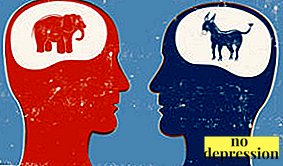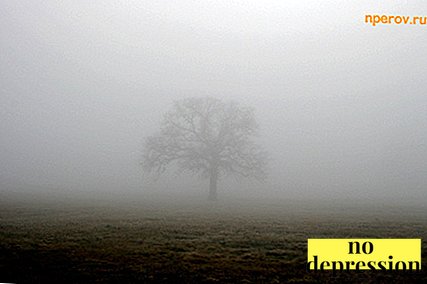Tell what it is the cognitive dissonance, simple words difficult, but quite real.
Cognitive dissonance is a condition in which a person feels internal discomfort, provoked by the collision with new ideas, concepts that began to conflict with other ideas, stereotypes, concepts present in the mind of the individual.
Despite the complexity of the definition, this state has been repeatedly encountered even children.
general information

It is important to understand that cognitive dissonance is not a pathology, not a symptom of mental illness, and completely normal state.
This means that the most frequently encountered in varying degrees are people who are actively exploring the world, read a lot and love to reason over the information received.
The willingness to overcome the discomfort associated with cognitive dissonance - positive signwhich speaks about the flexibility of the intellect and that the cognitive activity for a person is very important.
Every person has a definite attitude towards different situations, concepts, emotions, rules, stereotypes, due to the influence of:
- Society, the state. Political situation, legislation, mentality - all this contributes to the consolidation in the mind of the individual certain installations. Some of them are recognized by them, some are not. A person who has come to another country (especially if it is very different from the one where he grew up) often faces cognitive dissonance, because he considers ideas that he considers unacceptable to be normal, and vice versa.
- Parents. Parents are the people who are with the child from the moment of birth, bring him up and teach him in accordance with their ideas about the world, society. If, for example, the family is religious, the child will absorb it and later, when confronted with other ideas about religion, he will feel tangible discomfort.
- People with whom he has formed a friendly or romantic relationship. Close friends and loved ones can have a significant impact on a person's ideas about the world and society, even radically change them.
 It also gives rise to cognitive dissonance: for example, a person loves someone, but his chosen one or the chosen one has completely different ideas about certain phenomena, and he has to make decisions that change his world view to one degree or another.
It also gives rise to cognitive dissonance: for example, a person loves someone, but his chosen one or the chosen one has completely different ideas about certain phenomena, and he has to make decisions that change his world view to one degree or another. - Teachers, educators. These people also have their own ideas about the various phenomena that they share with students, pupils, exerting a serious influence on their still forming worldview.
- The teams in which it is located. Each person in the team has its own worldview and can speak about it, which affects the formation of opinions from other people.
- Other external and internal factors. Decisions made, certain events (death of loved ones, good luck or failure in different areas of society), the opinion of random people and idols, and much more.
If these well-established ideas clash with something new, unusual, differing to one degree or another, this activates a feeling of inner discomfort.
Often, cognitive dissonance is overcome by children and adolescents who gradually learn about the world, learn to interact with it, find ways to solve problems.
Also this state is observed whenever a person needs to make a choice, and the more important for him is this choice, the more acute the state of internal discomfort will be.

The concept of “cognitive dissonance” is partly similar to the well-known phraseological phrase “template break”, and this definition also has other synonyms: cognitive conflict, resonance.
The concept of "cognitive dissonance" developed and introduced into the theory of psychology Leon Festinger, American psychologist.
It happened in 1957. In his theory discusses the features of the conflict, the reaction to it of individuals and the whole society.
Causes of
Cognitive conflict occurs for the following reasons:
- In the presence of logical inconsistencies between the new and the old information. It can occur for various reasons, for example, in cases when a previously deliberately erroneous, illogical information was given to a person, but he did not check it and later learned the truth.
- Due to differences in cultural, religious customs and traditions. The more religious (or conservative) a person is, the more discomfort he will feel when confronted with something unusual, which is significantly different from what he is used to.
- In those situations where the opinion of a person on some issues is very different from the opinion prevalent in society. The conflict will be especially strong if the direction in which a person has strong convictions is important to him (his favorite work, personal dreams, ideas, the existence of addiction - alcohol, drugs, gambling and other moments).
 Information related to previous experience conflicts with information obtained in the new situation., that is, past experience does not apply in other circumstances, even if they are similar.
Information related to previous experience conflicts with information obtained in the new situation., that is, past experience does not apply in other circumstances, even if they are similar.
Theory
L. Festinger, who developed the theory of cognitive dissonance, put forward two hypotheses that underlie the whole idea of internal conflicts:
- A person who is faced with cognitive dissonance feels very uncomfortable (the degree of psychological discomfort depends on a number of different features), therefore it tends as quickly as possible. return to normal.
- The second hypothesis is based on the first: if a person experiences significant discomfort when confronted with a cognitive conflict, then will seek to avoid circumstancesat which this discomfort will recur.
The author in his theory gave and substantiated a number of basic definitions, and also conducted work that allowed him to understand how best to get out of cognitive dissonance.
In his research, typical situations of life are presented that allow the reader to better understand concepts, to compare them with their experience and find ways to solve personal problems.

The theory that considers the features of cognitive conflict is ranked as motivational theories.
It follows from this that dissonance significantly influences the behavior, actions and thinking of a single individual, and this reinforces the idea that a person will act on outlook and knowledge of how a person will act in a given situation.
Information owned by a person is not a collection of dry facts: it is capable of seriously influencing behavior, mental state, decisions, therefore it refers to motivators.
Also at the core of the definition of “cognitive dissonance” are two fundamental concepts:
- intelligence. Intellect means a huge complex of information accumulated by a person over a lifetime and including worldview and moral attitudes, opinions on various key issues, experience from a large number of different situations, and much more;
- affect. This state is a reaction that arose after the awareness of the presence of conflicting information in the intellect. This reaction can be expressed in different forms, but a person always feels discomfort when faced with contradictions.
For example, an individual can, having interpreted some of his actions, feel shame, and this feeling will hurt him until he finds a way out: he will bring himself evidence of his own innocence.

Also cognitive dissonance may be expressed in other feelings, depending on the peculiarities of the situation: in the form of anger, irritation, loss, devastation, strong surprise, anxiety.
In some cases, a collision with cognitive dissonance can seriously shake the mental health of a person: cause depression, phobias and other disorders.
This is especially true for sensitive, predisposed to self-digging people.
On the theory of cognitive dissonance of Leon Festinger in this video:
Examples
Cognitive dissonance refers to those concepts that are easier to comprehend and remember, if you read examples from life.
Several situations associated with convective conflict:
- Situation one. A man (let's call him H) a few years ago, a close relative who was very kind, understanding, bright, easily disposed to himself and was always ready to help. Most of his relatives, including H, remember him with great warmth and believe that he was completely unable to do something bad. But at some point, N learns that his dear relative had committed a serious crime in his youth, and this becomes a shock for him.
- Situation two. Two young men enter university. One of them has a gold medal and many awards, which he received at school competitions, and in general he makes a very positive impression, therefore, professors at the university assume that he will show his best from the exams.
 The second young man has very modest achievements: he graduated from school with threes and does not have any awards, so they do not expect anything special from him.
The second young man has very modest achievements: he graduated from school with threes and does not have any awards, so they do not expect anything special from him.But on the exam, a less distinguished youth perfectly answers the questions asked and shows excellent results, and the medalist makes many mistakes. This provokes the emergence of cognitive dissonance among teachers, whose expectations were not met.
- Situation three. A lifelong person was sure that the dishes from the larvae that are popular in some countries of the world should definitely be tasteless. But once he goes with friends to one of these countries, and they persuade him to argue to eat a few larvae. He eats them and with great surprise notes that this dish turned out to be much tastier than he imagined.
In this situation, the emergence of new information, sharply conflicting with existing, provokes the emergence of cognitive dissonance.
How to get rid of the condition?
To reduce the severity of discomfort, You can resort to the following methods:
- change behavior, depending on the circumstances;
- try to convince yourself;
- avoid information that can cause discomfort to return;
- develop the first point: accept the new information as true, comprehend your own mistakes and shortcomings and build a suitable line of conduct

All of these options can be applied in certain circumstances, but most psychotherapists consider the latter to be the best, but requires a certain amount of intelligence flexibility and therefore it may not be used by everyone and not in all cases.
Conjunctive dissonance is a condition that all people face almost daily.
It should not be treated negatively, since it is completely natural and benefits the person who gets new development incentives.

 It also gives rise to cognitive dissonance: for example, a person loves someone, but his chosen one or the chosen one has completely different ideas about certain phenomena, and he has to make decisions that change his world view to one degree or another.
It also gives rise to cognitive dissonance: for example, a person loves someone, but his chosen one or the chosen one has completely different ideas about certain phenomena, and he has to make decisions that change his world view to one degree or another. Information related to previous experience conflicts with information obtained in the new situation., that is, past experience does not apply in other circumstances, even if they are similar.
Information related to previous experience conflicts with information obtained in the new situation., that is, past experience does not apply in other circumstances, even if they are similar. The second young man has very modest achievements: he graduated from school with threes and does not have any awards, so they do not expect anything special from him.
The second young man has very modest achievements: he graduated from school with threes and does not have any awards, so they do not expect anything special from him.

